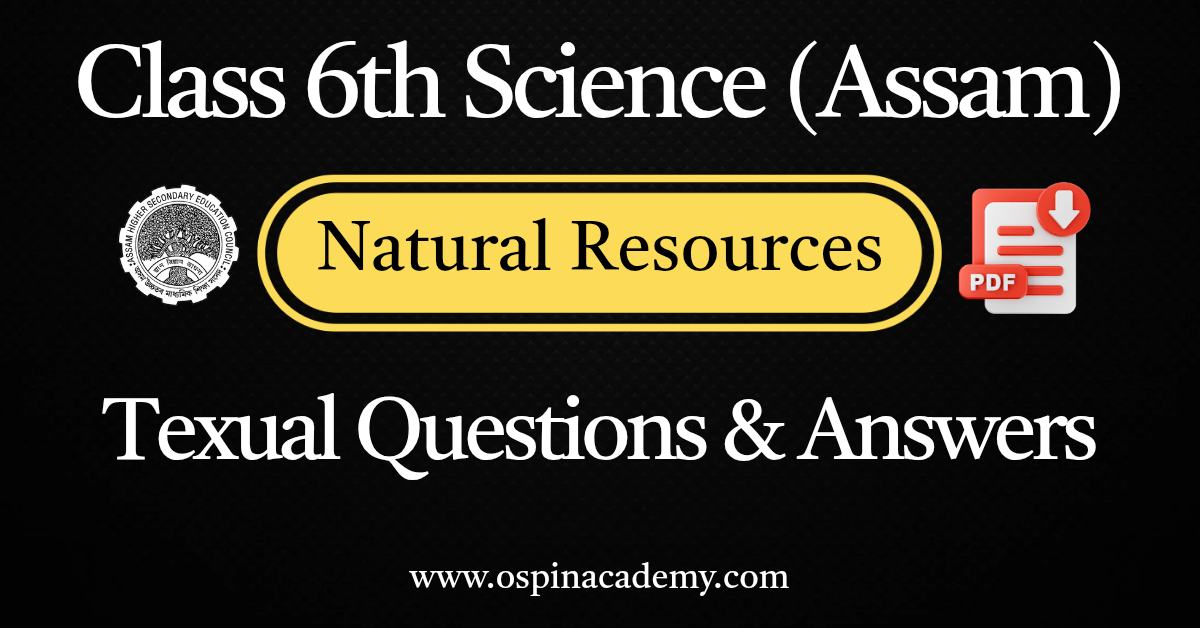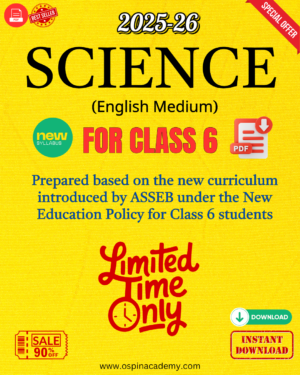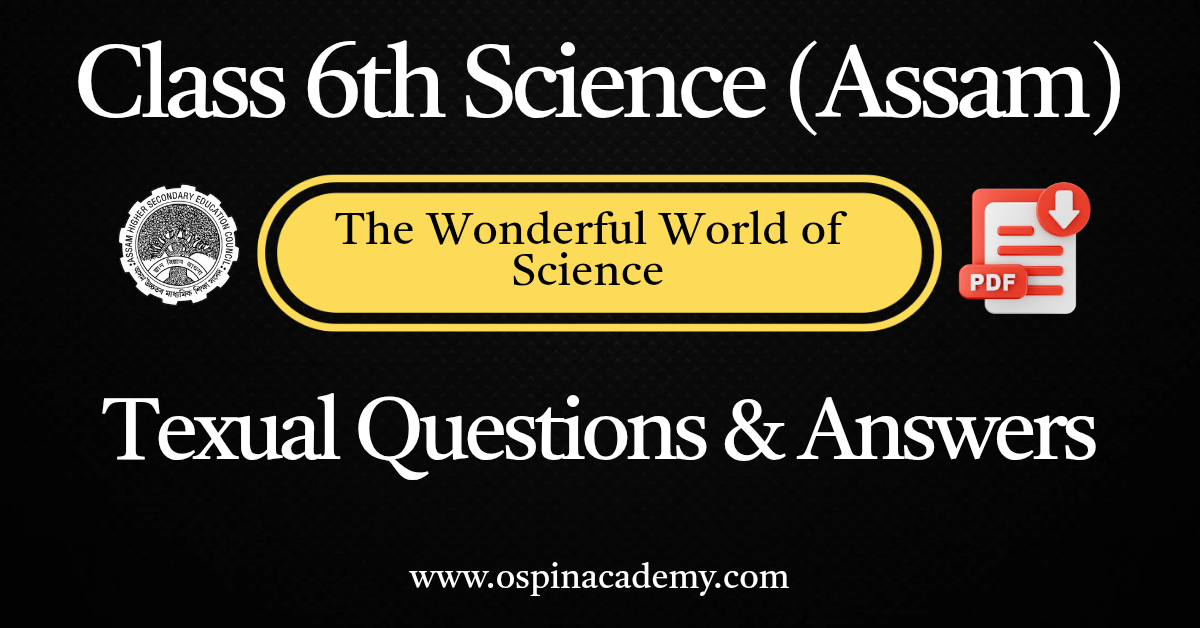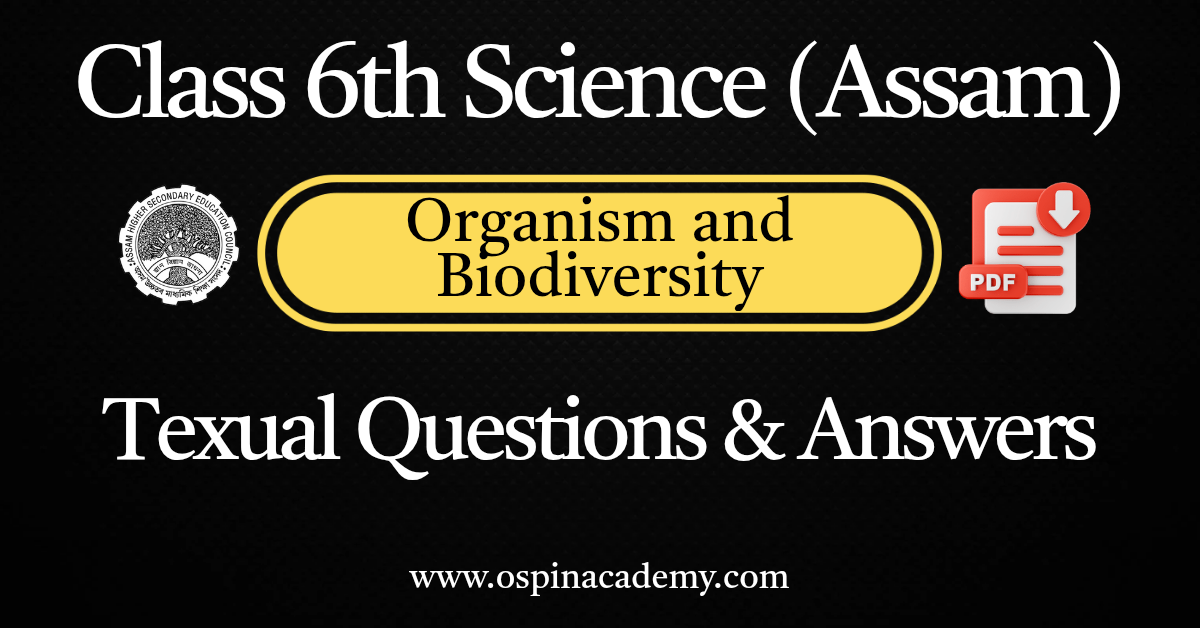Class 6 Science Chapter 12 Natural Resources Complete Solutions | SCERT Assam (English Medium)
Class 6 Science Chapter 12 – Natural Resources Complete Solutions (SCERT Assam – English Medium)
This chapter introduces the concept of natural resources, their types, uses, and importance for the environment and mankind. Aligned with the latest SCERT Assam syllabus, these easy solutions provide step-by-step explanations for all exercise questions. Key points include the classification of natural resources, renewable and non-renewable resources, and their real-life applications. This post aims to help students build a strong foundation for Board exams and environmental awareness. Chapter QR Code: F7Z2Z2. Ospin Academy offers clear and practical answers suitable for all English medium students.
✅ What you will learn:
- Definition and types of natural resources
- Difference between renewable and non-renewable resources
- Examples of natural resources from Assam and India
- Importance of sustainable use of resources
- Role of natural resources in daily life and environment
🎯 Benefits of Ospin Academy:
- Comprehensive solutions for all questions based on the latest SCERT Assam curriculum
- Special notes for Board exams and competitive tests
- Simple explanations for English medium learners
- Practical examples and concept-building exercises
- Extra tips for understanding application-based questions
Book QR Codes:
- Part 1 Book Code: P4D4R9
- Part 2 Book Code: F5C4J8
SCERT Assam Class 6 Science (Amar Bijnan) – English Medium Chapter-wise Solutions PDF
Special Combo Offer!
(For SCERT Assam Class 6, 2025)
Get complete chapter-wise Science (Amar Bijnan) solutions in English Medium prepared by expert teachers.
Covers all textbook exercises, key concepts, definitions, and diagrams as per the latest SCERT Assam syllabus.
Ideal for concept clarity, homework assistance, and exam preparation.
![]() Class 6th Science
Class 6th Science
Chapter – 12 Ospin Academy
NATURAL RESOURCES
Exercise
Q.1. Some pictures of natural resources are given below, In the right side of the list two options of renewable and Non-re-newable natural resources are given. Match the pictures of the items given in left side boxes in pictures with Appropri-ate option given in the right side boxes.
|
Items |
Renewable/Non-renewable |
|
Renewable |
|
|
Non-renewable |
|
|
Renewable |
|
|
Renewable |
|
|
Non-renewable |
Q. 2. Darken the circle of correct answer
(i) The resources which cannot be recreated after use are called-(a) Human resource.
(b) Non-renewable resource.
(c) Renewable resource.
(d) Inorganic resource.
Answer:(b)
(ii) The dry surface of the earth is called-
(a) Stone
(b) Soil
(c) Water
(d) Air
Answer:(b)
(iii) In which date of the year World Water Day is celebrated?
(a) 22nd April
(b) 22nd March
(c) 5th June
(d) 21 st March
Answer:(b)
(iv) The thin layer of air that extends Several Kilometers above the Surface of earth is called
(a) Hydrosphere
(b) Atmosphere
(c) The firmament
(d) None of the above
Answer:(b)
Q.3. Answer in one word.
(a) What Percentages of oxygen is there in the atmosphere?
Answer: 21%
(b) Write the name of an aquatic plant.
Answer: Lotus
(c) Write the name of an aquatic animal.
Answer: Fish
(d) What is the main source of power?
Answer: sun
Q.4 Identify the correct and incorrect statemants-
(a) Forest is natural resource.
Answer: correct.
(b) Stone is renewable resource.
Answer: incorrect.
(c) Pond is non-renewable resource.
Answer: incorrect
(d) The most commonly used fuel in vehicles is Kerosene.
Answer: in correct
(e) The highest amount of gas found in atmosphere is oxygen.
Answer: Incorrect.
Q.5. Give a brief answer—
(a) What are natural resources?
Answer: The resources which are derived from nature and useful for all living beings are called natural resources Example – Soil, Solar en-ergy, fossil Fuels etc.
(b) How many types of natural resoures are there and what are these?
Answer: There are two types of natural resources. these are
(i) re-newable resources
(ii) Non-renewable resources.
(c) What is renewable natural resource and what is non re-newable natural resource?
Answer: The resources that will never be exhausted from nature even if they are used are extensively are called renewable resources. Example sunlight, water, air etc. On the other hand, resources that cannot be re-generated after use are totally exhausted are called non-renewable resources. for ex-ample petrol, diesel, coal etc
(d) why the sun is called the main source of energy?
Answer: The sun provides energy in the form of sunlight, which sup-ports life, drives weather patterns and is the basis of food chains. that is why sun is called the main source of energy.
(e) Why we should conserve rainwater?
Answer: We should conserve rainwater, to prevent water scarcity, ensure availability for future use and reduce dependency on groundwa-ter
Q. 6. Why should we use Alternative energy?
Answer: Fossil fuels exist in nature in limited quantities. Therefore, the excessive use of these fuels will deplete the world’s fossil fuel re-sources. That is Why, we need to search for alternative energy Sources.
Q. 7. What type of energy we find from sunlight?
Answer: We get solar energy from sunlight.
Q. 8. What is windmill? What is used in the windmill
Answer: A windmill is a machine that converts wind energy into electrical energy. Wind is used in the windmill.
Q. 9. What are the two functions where air is used?
Answer: Two functions where air is used are—
(i) For breathing by humans and animals
(ii) For burning Fuels, as oxygen supports combustion
Q.10. Give an example From where you can understand that wind is a power.
Answer: Wind helps to rotate the blades of a windmill, Which generates electricity. This shows that wind has power.
Q. 11. You know that if, We keep a pot full of water outside under sun-shine it will be hot. what other things you can do by using the heat form the sun?
Answer: Using the heat form the sun. We can
(i) Dry clothes.
(ii) cook Food using a solar cooker
(iii) Generate electricity using solar panels.
Q. 12. Why petrol, diesel etc. are considered as non renewable natural resource?
Answer: Petrol, disel etc. are considered as non renewable natural resources because they take millions of years to form arid cannot be re-generated after use and get completely exhausted.
Q.13. What can you do at your home to conserve non renew-able resources?
Answer: To Conserve non renewable resources
(i) Avoid using vehicles for short distances.
(ii) Use public Transport, bicycle.
(iii) Raise awarness about resource conservation
(iv) Use fuel efficient appliances.
Q. 14. Althought most of the earth’s Surface is covered with wa-ter, the amount of usable water is very negligible, So how you can make your friends aware to prevent wastage of water?
Answer: (i) Conduct awarness programs about water conservation. (ii) Encourage fixing leaking taps.
(iii) promote rainwater harvesting.
(iv) Share posters or videos showing the importance of saving water.
Q. 15. Presently Government has initiated various Programmes in the field of plantation. Do you plant trees at any other time besides the governmment’s Programme in your School? If yes, in what occasion you plant the trees?
Answer: Yes, we plant trees on birthdays and other Special Occasions at school to help the environment?
Q. 16. Name an action or observation day taken up by the gov-ernment in the field of Conservation of natural resources.
Answer: World Environment Day (5 th June)
Q. 17: In Present time temperature in the World is increasing Day by Day. What steps can you take together with your friends to reduce temperature.
Answer: (i) Plant more trees
(ii) Use bicycles instead of vehicles.
(iii) Organise, an awarness program about Global warming and climate Change.
Q.18. What ideas you would like to transmit to ensure that water is not misused at your Home? How will you make the mem-bers of Your house aware towards this?
Answer: To ensure that water is misused at my home, I would suggest the following ideas.
(i) Fix leaking taps and pipes immediately.
(ii) Turn off taps while brushing teeth
(iii) Reuse leftover water, from washing vegetables for watering plants.
To make my family mumbers aware, I would:
(i) Talk to them about the importance of saving water.
(ii) Share simple tips to reduce water wastage.
(iii) Encourage everyone to follow water saving habits.
Class 6 Science Chapter 12 – Frequently Asked Questions
Get Free NCERT PDFs
If you want to download free PDFs of any chapter, click the link below and join our WhatsApp group:




